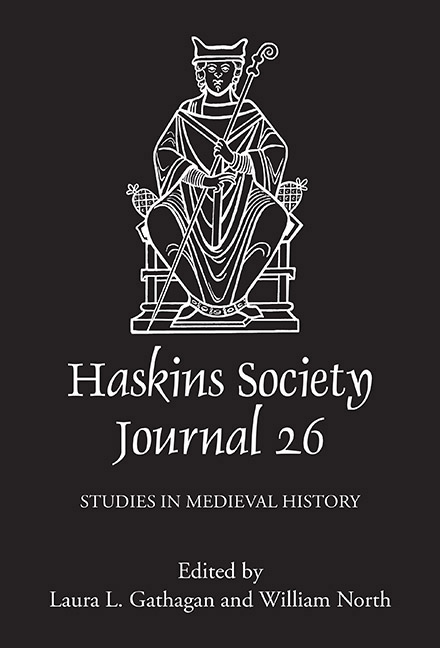Book contents
- Frontmatter
- Contents
- List of Figures
- Editors’ Note
- Abbreviations
- 1 Mores Tuos Fabricae Loquuntur Building Activity and the Rhetoric of Power in Ostrogothic Italy
- 2 A Hermeneutical Feast: Interreligious Dining in Early Medieval Conciliar Legislation
- 3 A Hypothetical Slave in Constantinople: Amalarius’s Liber Officialis and the Mediterranean Slave Trade
- 4 Welsh Kings at Anglo-Saxon Royal Assemblies (928–55)
- 5 The Diplomatics of Depredation: Reconsidering Holy Trinity Caen’s List of Losses
- 6 When Did Robert of Torigni First Receive Henry of Huntingdon’s Historia Anglorum, and Why Does It Matter?
- 7 A Coin Bearing Testimony to Duchess Matilda as Consors Regni
- 8 Fighting to be the Tallest Dwarf: Invidia and Competition in the Self-Conception of Eleventh- and Twelfth-Century Masters
- 9 Brut y Tywysogion: the History of the Princes and Twelfth-Century Cambro-Latin Historical Writing
- 10 The Use of English Annalistic Sources in Medieval Welsh Chronicles
- 11 A Franco-Danish Marriage and the Plot against England
2 - A Hermeneutical Feast: Interreligious Dining in Early Medieval Conciliar Legislation
Published online by Cambridge University Press: 25 May 2021
- Frontmatter
- Contents
- List of Figures
- Editors’ Note
- Abbreviations
- 1 Mores Tuos Fabricae Loquuntur Building Activity and the Rhetoric of Power in Ostrogothic Italy
- 2 A Hermeneutical Feast: Interreligious Dining in Early Medieval Conciliar Legislation
- 3 A Hypothetical Slave in Constantinople: Amalarius’s Liber Officialis and the Mediterranean Slave Trade
- 4 Welsh Kings at Anglo-Saxon Royal Assemblies (928–55)
- 5 The Diplomatics of Depredation: Reconsidering Holy Trinity Caen’s List of Losses
- 6 When Did Robert of Torigni First Receive Henry of Huntingdon’s Historia Anglorum, and Why Does It Matter?
- 7 A Coin Bearing Testimony to Duchess Matilda as Consors Regni
- 8 Fighting to be the Tallest Dwarf: Invidia and Competition in the Self-Conception of Eleventh- and Twelfth-Century Masters
- 9 Brut y Tywysogion: the History of the Princes and Twelfth-Century Cambro-Latin Historical Writing
- 10 The Use of English Annalistic Sources in Medieval Welsh Chronicles
- 11 A Franco-Danish Marriage and the Plot against England
Summary
In his recent major reevaluation of Jewish social and economic history, Michael Toch identifies frequent appearances of Jeremy Cohen's ‘hermeneutical Jew’ in the documentary record of early medieval Western Europe. According to Cohen's classic paradigm, textual references to individual Jews, and even to entire communities, do not necessarily refer to actual human beings but rather represent fictional straw-men created for polemical purposes by Christian authors. Sermon and hagiographical texts, in particular, demand a skeptical reading due to their entangled spiritual and rhetorical programs. In his own study, Toch concludes that due to the polemical nature of much of our documentation for a Jewish presence in early medieval Western Europe it is necessary to dismiss all but the most certain evidence for Jewish habitation, an approach that naturally leads to a minimalist view of Jewish demography.
Those scholars who do not share this same degree of skepticism argue that is it possible for a text to have a polemical intent while still reacting to, and thus reflecting, a historical reality. This is particularly true of normative legal sources, including both secular and ecclesiastical legislation. For his part, Toch rejects much of this material, too, as reliable evidence for Jewish life in the Early Middle Ages, concluding, ‘This is largely literary evidence of a predominantly ideological nature that reveals more about the expectations of a society and its view of itself than about what actually happened on a day-to-day basis. In many cases it does not reflect actual encounters with Jews but should be read as rhetorical exercises.’
Toch, of course, is not alone in reading ecclesiastical legislation as more reflective of episcopal ideology than of real-world circumstances, particularly where Jews are concerned. Such a reading, however, is based in part on the erroneous assumption that ecclesiastical councils simply repeated normative and formulaic proscriptions with minimal variation and without specific consideration. Yet legislative continuities in early medieval conciliar legislation lay not so much in verbatim repetition of canonical precedent as in the reiteration of broad legal principles that informed the composition of new, and contextspecific, decrees. The considerable expense and effort required to organize an ecclesiastical synod encouraged a practical and productive legislative agenda. While new legislation was expected to be grounded in the regulae of the past, conciliar canons were written for immediate application, not as vague statements of ideological intent.
- Type
- Chapter
- Information
- The Haskins Society Journal 262014. Studies in Medieval History, pp. 31 - 46Publisher: Boydell & BrewerPrint publication year: 2015



